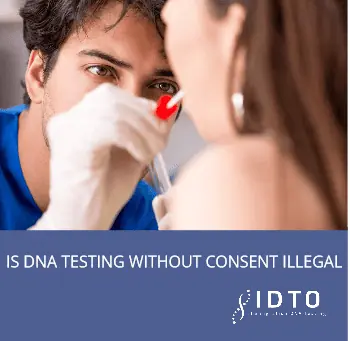
Can DNA Test be performed without permission from a guardian?
As we understand it. There is no specific law prohibiting a DNA test from being performed without the consent of a legal guardian. The only DNA tests that can be performed without consent are peace of mind DNA tests.
Most DNA testing companies will perform this service without a hitch if it is for peace of mind purposes. If you require a DNA test result to be submitted as evidence to prove a biological relationship then you will require permission from the mother or legal guardian for an under-aged child.
Peace of Mind Tests
What should be emphasized is that peace of mind paternity tests cannot be used for legal purposes. The reason being is, all legal DNA tests require a proper chain of custody be established. Peace of mind tests does not require a chain of custody be established.
If you would like to learn more about IDTO DNA relationship testing services. Please do not hesitate to contact our office today at 888-204-0583 to get started.
New York State Requirements
Please keep in mind, According to the New York State Dept of Health (NYSDOH) guidelines state that New York State residents will be required to obtain one of the following:
- a referral from a NYS licensed doctor,
- a letter from a New York State licensed attorney,
- a request for evidence letter from immigration or, a court order from a judge.
Therefore, New York State residents will be unable to perform home DNA tests. Only legal test can be performed regardless of the reason and will require one of the above-mentioned documents to perform a genetic test.
In addition, if the DNA testing company is not accredited by NYSDOH your results will not be recognized by family courts or any state institution.
Please keep in mind, acquiring consent does not only pertain to under-aged children but also pertains to any person who needs a caretaker and is unable to make decisions for themselves.
This does not only pertain to New York State residents but for every state, if you intend to use your DNA test result for legal purposes.
What are the consequences for performing a paternity test without consent?
There are a few things that should be considered when performing a legal paternity test with an under-aged child without permission.
If you are using the results for evidence submission in family court, your evidence will not likely be accepted. Which means, the judge will order second paternity test which will incur an additional cost.
Depending on the jurisdiction in which your child support or custody case is being heard. The judge may hold the alleged father in contempt which could incur possible jail time or fines. It should be noted, consequences will vary in each jurisdiction nationwide.
Please keep in mind, if an unmarried alleged father has signed an acknowledgment of paternity form for the child. In most cases, the man will be provided some legal rights.
Under this circumstance, an alleged father could perform legal paternity test without the mother or legal guardian being present.
It is recommended that the mother of the child participate in the paternity testing process it will increase the statistical analysis of the test and the mother will be required to participate in the paternity test if you were order to perform testing by a judge.
Can under-aged person give consent for DNA Test themselves?
No. Children under the age of 18 cannot give consent to perform any type of relationship test with a legal guardian or parental consent.
Remember, under-aged children are not fully mature to understand the full nature of the DNA Testing process or any of the possible legal consequences that may occur.
Conclusion:
In summary, There are no specific law stating that performing a legal paternity test without the custodial parent giving consent. This does not mean by performing a legal test without consent goes without consequence.
We encourage unmarried alleged fathers seeking to prove the paternity of a child by working with the mother to attain consent or, if the mother does not consent, you can file a paternity petition with family court.
It is important that you consult with a legal professional in your state to inquire about paternity establishment laws. Remember, parental consent is also about the well-being of child.

